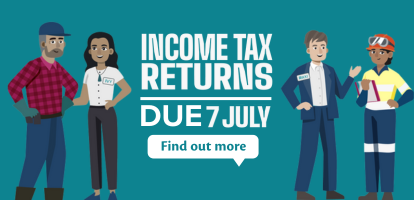Income tax returns for untaxed income are due 7 July 2025. We’ve made some changes that might affect how you complete your income tax return for the 2024-25 tax year.
Contact us if we sent you an income tax return and you think you don't need to file it. We’ll update your details. For example, you may only earned salary and wage income and no extra untaxed income.
Know what to file
Complete an Individual income tax return - IR3 at the end of the tax year if you received more than $200 (before tax) in income and we have not been told about.
Generally, we know about taxed income you received during the year, like salary or wages. But we don’t always know about untaxed income. You'll need to declare any untaxed income, like from:
- self-employment
- overseas
- rental property including Airbnb and Bookabach
- taxable property sales
- 'under the table' cash jobs
- an estate, trust, or partnership
You'll need to pay tax to New Zealand on the income you earn from New Zealand sources if you're a non-resident.
Generally, we know about any taxed income you received during the year, like salary or wages. But we don’t always know about untaxed income. You'll need to complete an Income tax return for non resident individual taxpayers - IR3NR if you:
- received income from New Zealand that was not taxed
- received income from New Zealand that was taxed at the wrong rate, or
- had losses or excess imputation credits carried forward from the previous year.
Income tax return for non resident individual taxpayers (IR3NR)
If your company is a New Zealand resident for tax purposes, and is active in New Zealand, you'll need to complete a company income tax return at the end of the tax year.
You may need to give us financial information about your company in your tax return, or in other financial reports.
Financial reporting for companies
If you're no longer trading, you still have to file returns unless you complete a non-active company declaration.
Complete a Non-active company declaration
File a Companies income tax return IR4
Complete a trust and estate income tax return if you are a trustee of a trust, or the executor or administrator of a deceased person's estate, to account for any income the trust or the estate earns.
If you meet the criteria, you can declare a trust as non-active. If we approve your application, you will not have to file income tax returns for your trust.
In 2022 we made changes to the annual reporting requirements for trusts. Most trusts are now required to give us more information in their tax returns. Check what more information you need to provide.
Additional reporting requirements for NZ domestic trusts
Partnerships file partnership and look-through company income tax returns each year. These returns show how much profit or loss was shared between each partner.
Partnerships do not pay income tax on their profits. Instead, the profit or loss is shared between the partners. The partners separately pay income tax on any profit, and they can also claim any partnership losses against their own personal income.
Each partner also needs to file their own Individual income tax return showing their partnership income or losses.
File a Partnerships and look-through companies income tax return - IR7
All Māori authorities must file a Māori authority income tax return each year unless a non-active declaration has been completed.
Income tax for Maori authorities
New Zealand clubs and societies must file a Clubs and societies tax return – IR9 every year unless they have an income tax exemption.
Your club or society may be able to claim tax benefits if it's being run as a not-for-profit. This could include paying less or no tax and not having to file income tax returns. Your club or society must meet certain requirements. If you do, you can apply to us to be approved as a not-for-profit.
Claiming mortgage interest for residential rental properties
Interest limitation rules apply to residential rental properties unless you have an exclusion or exemption.
If you own a residential rental property, you can claim 80% of the interest you incurred. It does not matter when you purchased the property or drew down the loan.
There are some exclusions and exemptions from the rules. For example:
- main homes
- property development
- new builds.
Talk to a professional or find out more on our website.
If you’re claiming interest expenses (deductions), you need to complete the interest fields in your income tax return as well as completing your IR3R. Copy the amounts from your IR3R to the right fields in your income tax return.
If you’ve sold a property that meets the bright-line property rule, you’ll need to complete a Bright-line property sale information form — IR833 as well as your tax return. Include any share of profit in your return. Add the share of profit at box 12 of your IR833 to the net bright-line profit (excluding losses) field in your tax return.
Complete a Financial statements summary - IR10
Complete a Bright-line property sale information form - IR833
If you have a refund or tax to pay
Once we receive all of your information, we'll work out if you're due a refund or if you have tax to pay.


